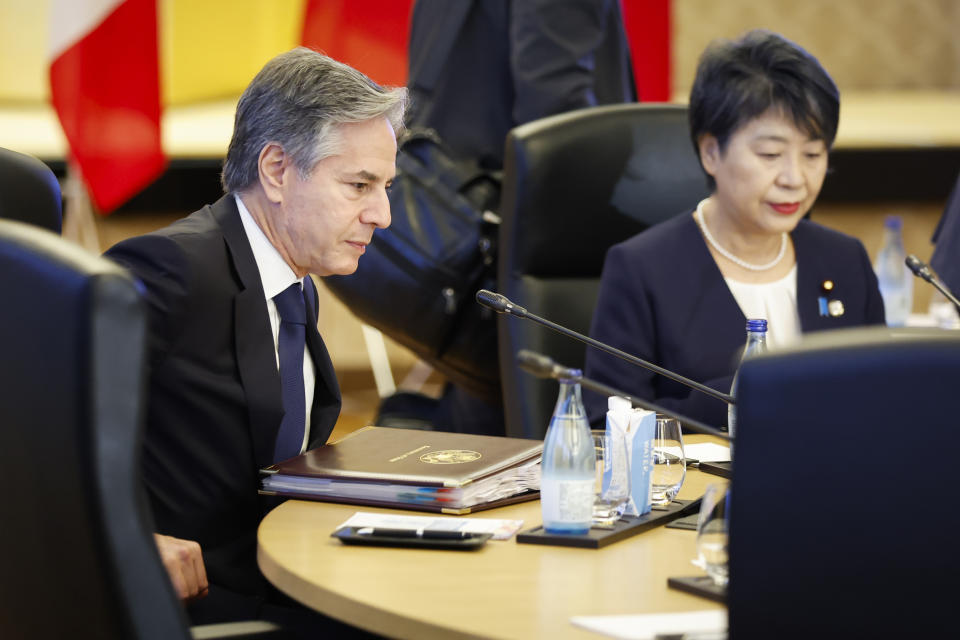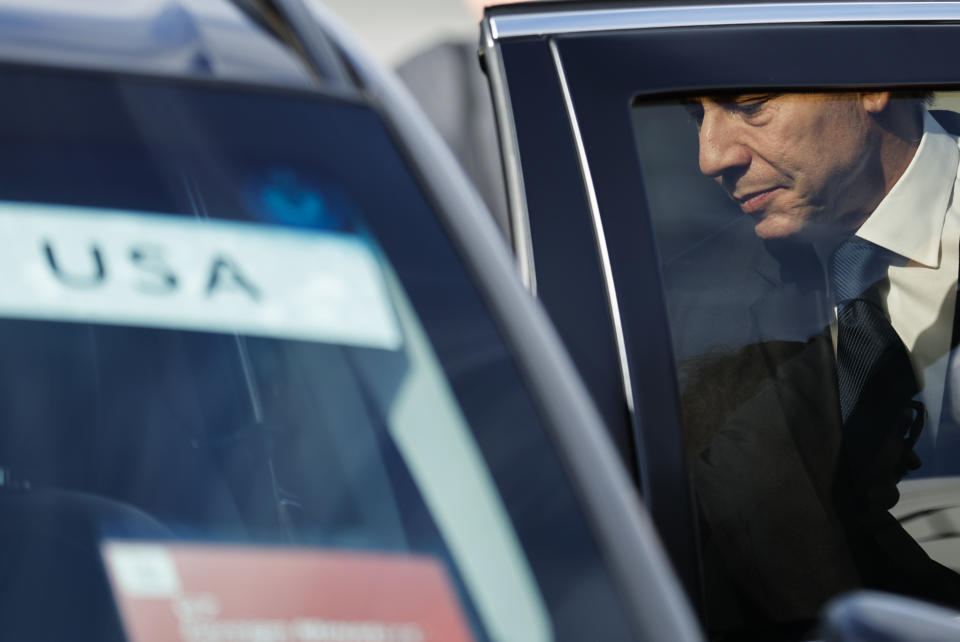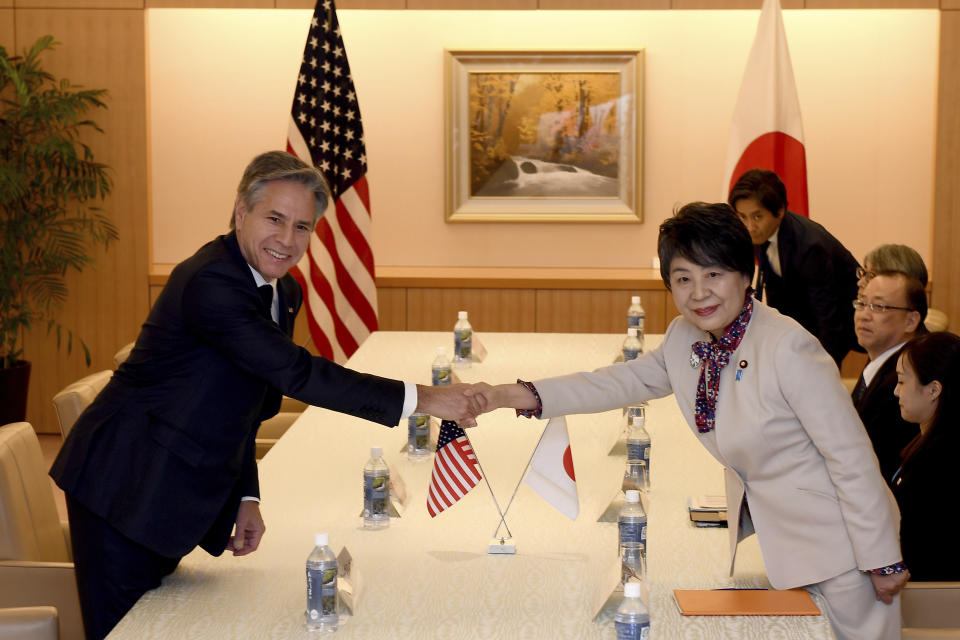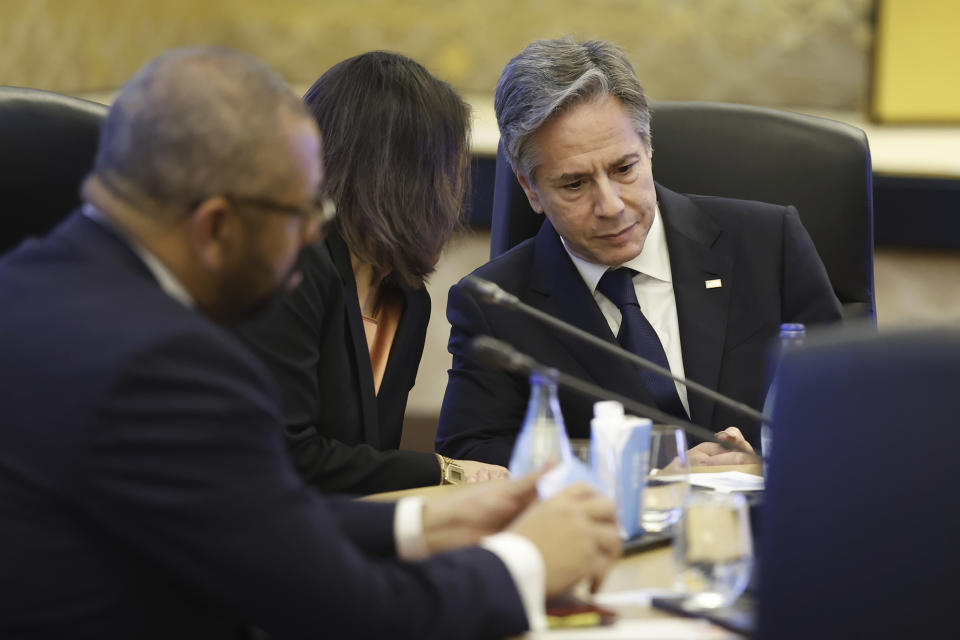G7 Diplomats Seek Unity on Israel-Hamas Conflict and Global Crises
November 8, 2023 | by b1og.net


In the ever-evolving landscape of global politics, an urgent and pressing matter has taken center stage for the G7 diplomats: the Israel-Hamas conflict. Led by Secretary of State Antony Blinken and a team of esteemed diplomats, the G7 is determined to seek unity amongst its member nations in addressing this conflict and finding a path towards resolution. However, their ambitions do not stop there. Alongside the Israel-Hamas conflict, the G7 diplomats are eager to explore potential solutions to other pressing global crises, including climate change and the ongoing COVID-19 pandemic. With unity, cooperation, and a shared sense of responsibility, the G7 diplomats are poised to tackle these challenges head-on.
▶ [Kucoin] Transaction fee 0% discount CODE◀
G7 Diplomats Seek Unity on Israel-Hamas Conflict
Background of the Israel-Hamas Conflict
The Israel-Hamas conflict is a long-standing and complex issue that has resulted in the loss of countless lives and exacerbation of tensions in the region. The conflict stems from a deep-seated dispute between Israelis and Palestinians over land, self-governance, and security. The current escalation in violence, triggered by clashes in Jerusalem, has further intensified the already volatile situation. Both Israel and Hamas, the Islamist political and military organization governing Gaza, have engaged in military operations, resulting in civilian casualties and significant damage to infrastructure.
The G7’s Importance in Addressing the Conflict
As one of the leading international forums for economic and political cooperation, the Group of Seven (G7) plays a crucial role in addressing pressing global issues. With member countries consisting of the United States, Canada, France, Germany, Italy, Japan, and the United Kingdom, the G7 represents some of the world’s most influential democracies. Given their economic and political weight, G7 countries have the capacity to shape international consensus and take collective action to address conflicts such as the Israel-Hamas crisis.
Efforts to Achieve Unity Among G7 Countries
Blinken and other senior diplomats are actively seeking unity among G7 countries regarding the Israel-Hamas conflict. This involves engaging in extensive dialogues, consultations, and negotiations to ensure a coordinated approach. The G7 recognizes the importance of presenting a united front to effectively address the conflict and its broader implications. By fostering consensus and cooperation, G7 diplomats aim to enhance diplomatic leverage and influence potential outcomes.
Addressing Global Crises
The G7’s Role in Addressing Global Crises
Beyond the Israel-Hamas conflict, the G7 has a critical role in addressing various global crises. These crises often transcend national borders and require concerted efforts to safeguard global security, prosperity, and sustainability. Through its collective action and cooperation, the G7 can develop strategies, initiatives, and policies to mitigate the impact of these crises and promote global stability.
Climate Change as a Global Crisis
Climate change poses a major threat to the global community. Rising temperatures, extreme weather events, and environmental degradation have far-reaching consequences for people and the planet. Recognizing the urgency of addressing this crisis, the G7 has the opportunity to lead by example through their commitments to reducing carbon emissions, transitioning to clean energy sources, and supporting climate resilience initiatives. Collaboration among G7 countries can strengthen global climate action and encourage other nations to take bold steps towards a sustainable future.
COVID-19 Pandemic and International Cooperation
The COVID-19 pandemic has starkly demonstrated the interconnectedness of global health and the need for international cooperation. G7 countries, with their advanced healthcare systems and technological capabilities, have a responsibility to lead the global response to the pandemic. By coordinating efforts to ensure equitable vaccine distribution, sharing knowledge and resources, and supporting the recovery of vulnerable economies, the G7 can play a pivotal role in curbing the spread of the virus and mitigating its devastating social and economic impacts.
▶ [Kucoin] Transaction fee 0% discount CODE◀
Impact of Israel-Hamas Conflict on Global Crises
Humanitarian Crisis in Gaza
The ongoing Israel-Hamas conflict has exacerbated the already dire humanitarian situation in Gaza. Innocent civilians, including children, have been caught in the crossfire, resulting in a considerable loss of life and widespread destruction. The G7 recognizes the urgent need for humanitarian assistance, including providing access to medical care, food, and clean water to those affected. Addressing the immediate humanitarian crisis in Gaza is essential to prevent further suffering and alleviate the strain on already overstretched aid organizations.
Implications for Regional Stability
The Israel-Hamas conflict has significant implications for regional stability in the Middle East. The escalation of violence can trigger unrest and acts of aggression from neighboring countries. The G7, with its collective influence and diplomatic channels, has a crucial role in promoting de-escalation efforts and facilitating dialogue between parties involved. By engaging with regional partners and stakeholders, the G7 can work towards fostering stability and easing tensions, thus preventing the conflict from spilling over and destabilizing the wider region.
Interconnectedness of Global Crises
The Israel-Hamas conflict reminds us of the interconnected nature of global crises. It underscores the fact that conflicts, environmental challenges, and health emergencies are not isolated issues but rather interconnected components of a complex global landscape. The G7’s approach to addressing the Israel-Hamas conflict should take into account these interconnections and recognize that long-term solutions require collective action on multiple fronts. By addressing root causes and finding inclusive approaches, the G7 can contribute to resolving conflicts while addressing underlying societal issues that contribute to global crises.
Strategies for Resolving the Israel-Hamas Conflict
Diplomatic Negotiations and Ceasefire
Diplomatic negotiations and achieving a sustainable ceasefire are crucial steps towards resolving the Israel-Hamas conflict. The G7 can leverage its diplomatic capabilities and networks to facilitate dialogue between the parties involved. By promoting a genuine and inclusive peace process, the G7 can help establish common ground and build trust among Israelis, Palestinians, and other regional stakeholders. This would create an enabling environment for negotiations and pave the way for a durable ceasefire that addresses the longstanding grievances of all parties.
International Mediation Efforts
International mediation plays a vital role in resolving complex conflicts such as the Israel-Hamas dispute. The G7, through its diplomatic channels, can actively engage in mediation efforts and encourage all parties to participate constructively. By fostering dialogue, offering impartial perspectives, and providing technical expertise, the G7 can contribute to bridging the gaps between the conflicting parties and facilitating a peaceful resolution. This requires a genuine commitment from all G7 members to support mediation efforts and invest in long-term solutions.
Role of the Quartet
The Quartet, consisting of the United Nations, the European Union, the United States, and Russia, has played a prominent role in mediating the Israel-Hamas conflict. The G7 can strengthen its engagement with the Quartet and actively support its efforts to facilitate peace negotiations. By amplifying the influence of the Quartet, the G7 can contribute to a more comprehensive and inclusive approach to resolving the conflict. This would enhance the legitimacy of the peace process and increase the prospects for a sustainable resolution.
G7 Efforts in Supporting a Sustainable Ceasefire
Joint Statements and Declarations
The G7 can issue joint statements and declarations denouncing the violence and expressing solidarity with affected parties. These statements serve to amplify the international community’s collective voice and convey a unified message calling for an immediate ceasefire. By speaking with one voice, the G7 can enhance the diplomatic pressure on the conflicting parties and signal their commitment to resolving the Israel-Hamas conflict through peaceful means.
Lobbying for Peaceful Dialogue
G7 countries have significant political influence on the global stage. By leveraging their diplomatic and economic power, they can engage in lobbying efforts to encourage the conflicting parties to prioritize peaceful dialogue and negotiations. This can involve direct engagement with Israeli and Palestinian leaders, as well as diplomatic initiatives with regional actors. The G7 can use its collective leverage to advocate for de-escalation, cessation of hostilities, and a commitment to pursuing a peaceful resolution to the conflict.
Humanitarian Aid and Post-Conflict Reconstruction
To support a sustainable ceasefire and contribute to long-term stability, the G7 can provide humanitarian aid and support in post-conflict reconstruction efforts. This includes investing in essential services such as healthcare, education, and infrastructure development in conflict-affected areas. By addressing the root causes of the conflict, the G7 can help create a conducive environment for sustainable peace and contribute to the overall well-being of the affected populations. Additionally, targeted support for economic recovery and inclusive development can ensure the equitable distribution of resources and contribute to addressing socioeconomic grievances.
Policy Recommendations to Address Global Crises
Sustainable Development and Climate Change
Addressing global crises such as climate change requires a holistic and sustainable development approach. The G7 can champion policies that promote sustainable economic growth, environmental conservation, and social development. By adopting green technologies, investing in renewable energy, and implementing measures to reduce carbon emissions, G7 countries can lead by example and encourage other nations to follow suit. This would pave the way for a more sustainable future and mitigate the adverse effects of climate change.
Vaccine Distribution and Resilience against Future Pandemics
In response to the COVID-19 pandemic, the G7 can prioritize policies that ensure equitable access to vaccines, strengthen healthcare systems, and support the development of robust pandemic response mechanisms. By collaborating with international organizations, sharing best practices, and providing financial assistance, G7 countries can contribute to global efforts to combat the current pandemic and increase resilience against future pandemics. This includes investing in vaccine development and production capacity, as well as supporting research and development for new and emerging diseases.
Tackling Economic Inequalities
Economic inequalities pose a significant threat to global stability and prosperity. The G7 can address this challenge by promoting inclusive economic policies, investing in education and job creation, and supporting the growth of small and medium-sized enterprises. By reducing disparities, fostering social mobility, and promoting fair trade practices, the G7 can contribute to poverty eradication and social cohesion. This would create a more equitable and sustainable global economic system that benefits all nations, regardless of their wealth or development levels.
Challenges and Obstacles to Achieving Unity
Diverse Perspectives and Interests Among G7 Members
Achieving unity among G7 members can be challenging due to divergent perspectives and interests. Each country brings its unique stance on the Israel-Hamas conflict and other global crises based on its national priorities and historical ties. Finding common ground and reconciling these differences requires extensive diplomatic negotiations, compromise, and commitment to the collective goals of the G7. By recognizing and respecting the diversity within the group, G7 diplomats can navigate these challenges and develop strategies that accommodate various perspectives.
Political Considerations and Public Opinion
Political considerations and public opinion can influence the G7’s approach to addressing global crises, including the Israel-Hamas conflict. Domestic political dynamics, electoral cycles, and public sentiment can shape the level of engagement, willingness to intervene, and the prioritization of resources. G7 diplomats need to balance the need for decisive action with the realities of domestic politics to ensure sustained commitment and effective cooperation. Engaging with stakeholders and communicating the importance of addressing these crises can help build public support and facilitate political will.
Limitations of Diplomatic Power
Although the G7 wields significant diplomatic power, it has limitations when it comes to resolving complex conflicts such as the Israel-Hamas dispute. The conflicting parties may have entrenched positions, deep-rooted grievances, and sources of external support that impede diplomatic efforts. Moreover, the G7’s influence may be constrained by geopolitical considerations and the dynamics of global power. Despite these limitations, the G7 can leverage its diplomatic relationships, international standing, and economic influence to create an environment conducive to negotiations and facilitate initiatives aimed at resolving the conflict.
Cooperation with Non-G7 Countries and Organizations
Engaging Regional and Global Partners
Addressing global crises requires collaboration not just within the G7, but also with non-G7 countries and regional partners. The G7 can actively engage with nations in the Middle East and beyond to seek their perspectives, support, and cooperation in resolving the Israel-Hamas conflict. By fostering dialogue and cooperation with regional stakeholders, the G7 can broaden its influence and build more robust alliances. This would enhance the prospects for a sustainable resolution to the conflict and strengthen collective efforts in addressing global challenges.
Collaboration with the United Nations
The United Nations (UN) plays a vital role in resolving conflicts, promoting peace, and addressing global crises. The G7 can collaborate closely with the UN to leverage its expertise, diplomatic networks, and peacekeeping capabilities. By aligning their efforts, the G7 and the UN can augment each other’s actions and pool resources to address the multifaceted dimensions of the Israel-Hamas conflict. This collaboration would enhance the legitimacy and effectiveness of international efforts in resolving the conflict and contribute to upholding international law and promoting stability.
Dialogues with Other Global Powers
The G7 can also engage in constructive dialogues with other global powers, including countries such as China and Russia, to address the Israel-Hamas conflict and global crises collectively. These countries possess significant diplomatic, economic, and military capabilities that can influence regional dynamics and global stability. By promoting open and inclusive dialogues, the G7 can facilitate a broader understanding of diverse perspectives and identify areas of common interest. Building partnerships with these global powers can enhance the effectiveness of collective actions and generate innovative solutions.
Public Perception and Media Coverage
Public Opinion Towards the G7’s Role
Public opinion plays a crucial role in shaping the G7’s approach to addressing global crises, including the Israel-Hamas conflict. G7 countries need to actively communicate their efforts, rationale, and impact to foster understanding and garner support from their respective populations. Public engagement initiatives, such as town halls, public consultations, and awareness campaigns, can help bridge the information gap and empower citizens to contribute to policy discussions. By promoting transparency and accountability, the G7 can build trust, address concerns, and ensure public opinion aligns with collective objectives.
Media Coverage of the Israel-Hamas Conflict and Global Crises
Media coverage has a significant impact on public perception and understanding of global crises. The G7 can actively engage with media organizations to provide accurate and comprehensive information on the Israel-Hamas conflict and other global challenges. Press briefings, interviews, and access to reliable sources can help shape media narratives and promote informed public discourse. The G7 can also collaborate with media outlets across member countries to ensure unbiased and responsible reporting, fostering a more nuanced understanding of the complexities of global crises.
Promoting Transparent Information and Accurate Reporting
Transparency and accurate reporting are crucial for addressing global crises effectively. The G7 can promote the dissemination of transparent information, including data, analysis, and expert opinions, to facilitate informed decision-making. By supporting independent journalism, fact-checking initiatives, and open access to information, the G7 can help counter misinformation and promote responsible reporting. This would enhance public understanding, build trust, and facilitate evidence-based policymaking, thus contributing to more effective solutions to global crises.
The Way Forward for G7 Diplomats
Long-Term Solutions for the Israel-Hamas Conflict
Resolving the Israel-Hamas conflict requires a long-term approach that addresses the underlying causes and grievances. G7 diplomats should continue to support negotiations, dialogue, and mediation efforts, emphasizing inclusivity and respect for international law. By engaging with all relevant parties, investing in grassroots initiatives, and promoting reconciliation, the G7 can contribute to lasting peace and stability in the region. This requires sustained commitment, coordination with regional and international partners, and a recognition of the complexities involved.
Continued Cooperation on Global Crises
Addressing global crises necessitates continued cooperation and coordination among G7 countries. The G7 should maintain a unified front and build on existing platforms and mechanisms to develop comprehensive strategies and initiatives. This includes regular G7 summits, working groups, and expert consultations that foster collaboration, knowledge-sharing, and joint problem-solving. By pooling resources, expertise, and political will, G7 diplomats can amplify their impact on global crises and spearhead meaningful change.
Building Stronger Diplomatic Alliances
To address global crises effectively, the G7 should focus on building stronger diplomatic alliances with both traditional and emerging powers. This entails forging partnerships based on shared values, common interests, and mutual respect. By cultivating relationships with countries beyond the G7, the diplomatic leverage of G7 countries can be enhanced to tackle global challenges more comprehensively. Through dialogue, cooperation, and capacity-building initiatives, the G7 can foster a more inclusive and collaborative approach to addressing global crises, resulting in more sustainable outcomes.
In conclusion, G7 diplomats are actively seeking unity on the Israel-Hamas conflict and other global crises. By leveraging their diplomatic capabilities, addressing the interconnectedness of these crises, and cooperating with non-G7 countries and organizations, G7 countries have the potential to make a significant impact. Through joint efforts, sustainable approaches, and public engagement, the G7 can contribute to long-term solutions, foster stability, and build stronger diplomatic alliances for a more peaceful and prosperous world.
RELATED POSTS
View all







